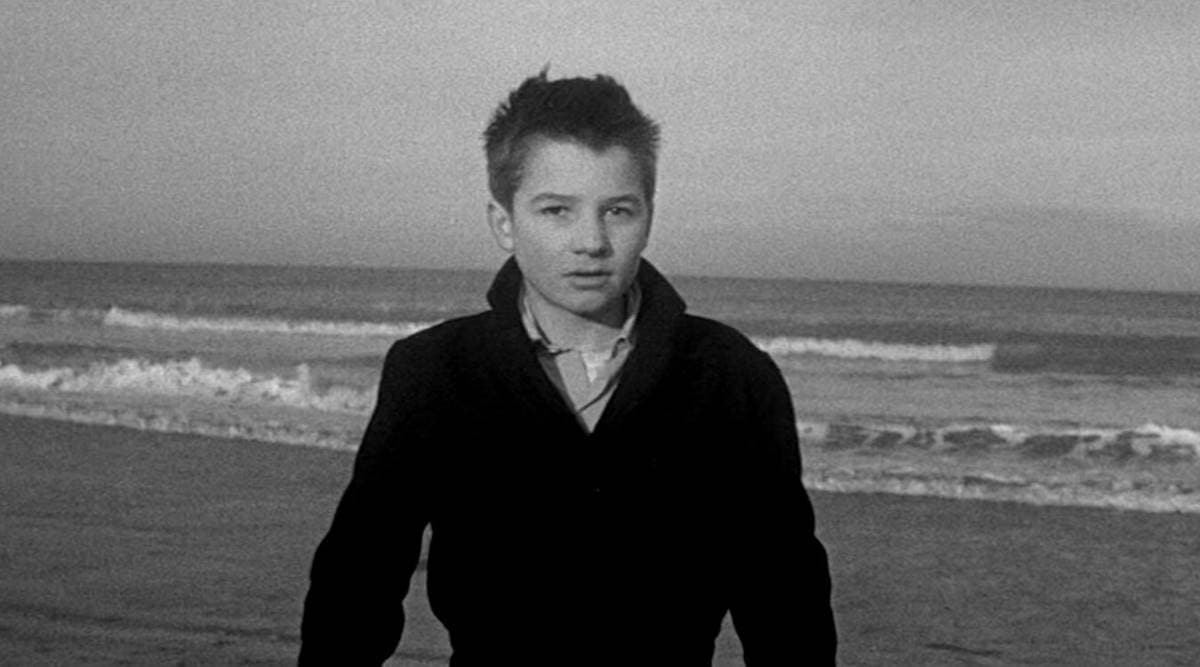 A still from The 400 Blows.
A still from The 400 Blows. Do you know what is common among influential filmmakers around the world — Stanley Kubrick, Quentin Tarantino, Christopher Nolan? Many of them did not go to film school. At home, we have Satyajit Ray and Mani Ratnam who studied filmmaking formally. But, these filmmakers were so passionate about cinema that they couldn’t help but make the kind of movies they loved. François Truffaut, the enfant terrible of the French New Wave cinema, is one such auteur who changed the course of filmmaking with his rebellious approach to cinema. Finding his way into filmmaking via film criticism, he lived cinema to the extent that he became a personification of it.
François Truffaut gifted world cinema a slew of unconventional methods to tell a story. The French New Wave is an important cultural movement in the history of cinema as it disregarded every known rule of filmmaking. The movement gave birth to a new kind of cinema, which continues to influence filmmakers till date. Truffaut admired everything that Hollywood and the superstar filmmakers of his time did – Orson Welles and Alfred Hitchcock influenced him a lot. And you can see many Hollywood influences in Truffaut’s films.
Make no mistake, he was serious about cinema but didn’t make excruciatingly slow films that test your patience. You don’t need undivided attention or a higher perspective to understand the complexity and absurdity of his films. His movies were rather easy on the eyes and mind. And his directorial debut Les Quatre Cents Coups (The 400 Blows in English) will be a perfect entry point to understand the French New Wave and how it shaped the course of mainstream cinema worldwide. It also got Truffaut a Best Director award at Cannes and a Best Original Screenplay Oscar nomination.
The 400 Blows is considered semi-autobiographical. In a documentary style, the camera follows the life of Antoine Doinel (played by Jean-Pierre Léaud). He is a teenager with a rebellious attitude, and naturally, he’s programmed to break the rules. He can’t help but defy the norms and do his own thing, even if it means getting into serious trouble or facing punishment, which is at times painful or humiliating or both. Why is he always acting out? Is there some deep-rooted problem in him that escapes us?
Truffaut doesn’t really psychoanalyse Antoine. He simply watches him as he goes to great lengths to outgrow adolescence and become an adult, which will allow him to do whatever he wants without having to explain himself every time. In fact, it is the story of a child acting like a grown man. If you watch closely, you can see how fair it is for a child to feel the burden of childhood. So much so that he wants to leave it behind and embrace the misery of adulthood in a hurry.
Antoine’s dysfunctional family is the core reason behind him rejecting everything that’s offered to him. His not-so-caring step-father, his selfish mother and a system that fails to treat him like a child. They perceive him as a problem that could be solved if he simply rolled over and played dead like everyone else. And we are talking about Paris, the citadel of freedom, liberalism, love and art. Amid all the great architectural monuments of the 1950s Paris, we also see poverty and dirt. The city is full of people who are so obsessed with their own desires, and don’t notice two kids running around smoking, drinking and thieving.
Truffaut creates enough space and time for you to gather what you will from Antoine’s situation. You could relate to him, and the film may take you down memory lane where you remember all your childhood mischief. It could also remind you of your effort to run away from childhood and your impatience to become an adult. The predicament of Antoine will strike a chord. And it will become a permanent part of your memory.
“I demand that a film express either the joy of making cinema or the agony of making cinema. I am not at all interested in anything in between,” Truffaut had once said, and with The 400 Blows, he shows us both.
François Truffaut’s The 400 Blows is streaming on Mubi.
- The Indian Express website has been rated GREEN for its credibility and trustworthiness by Newsguard, a global service that rates news sources for their journalistic standards.

